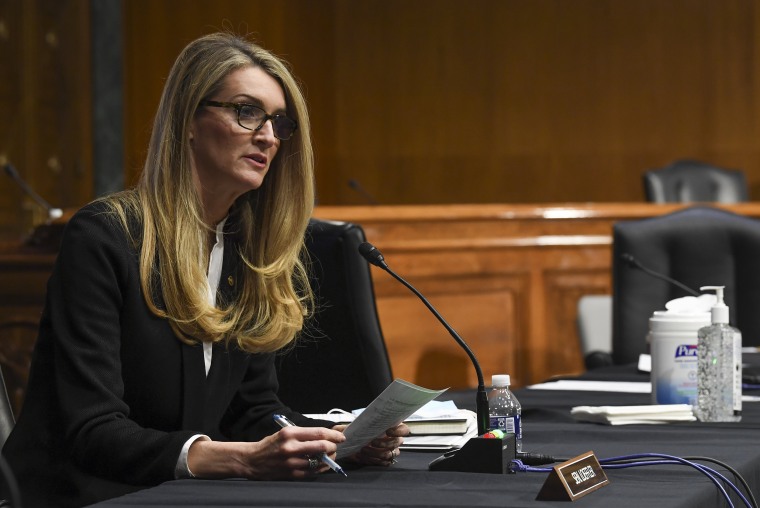In 2020, few states are as politically significant as Georgia -- the only state that's home to a competitive presidential race and two competitive U.S. Senate races.
How fierce is the fight in Georgia? A new Atlanta Journal-Constitution poll found Joe Biden and Donald Trump tied in the state, with each garnering 47% support. Given that Georgia has 16 electoral votes -- more than several other key battlegrounds, including Michigan, Arizona, and North Carolina -- it's safe bet we'll see both parties focusing heavily on the Peach State in the coming weeks.
The same poll found incumbent Sen. David Perdue (R) barely ahead of Jon Ossoff (D), 47% to 45%.
As for Georgia's other U.S. Senate race, that's quite a bit more complicated. The appointed Republican incumbent is literally telling voters she's to the right of Attila the Hun.
U.S. Sen. Kelly Loeffler is trying to join the pantheon of provocative Georgia TV ads with a new ad comparing her to a feared emperor. In the ad, released Monday, a couple lounging on a couch compare notes about Loeffler's conservative record backing President Donald Trump before a khaki-wearing actor remarks: "Yep, she's more conservative than Attila the Hun."
Her GOP rival similarly made headlines for condemning Ruth Bader Ginsburg shortly after her death.
As condolences for Ruth Bader Ginsburg's family and fond memories of her life poured in from Democrats and Republicans alike, GOP Rep. Doug Collins' voice was missing from those honoring her. Instead, Collins received backlash for his tweet Friday night focusing on Ginsburg's position on abortion rights.
The congressman recognized RBG's passing by extending his condolences "to the more than 30 million innocent babies that have been murdered during the decades that Ruth Bader Ginsburg defended pro-abortion laws." In response to criticisms, Collins added that he doesn't believe this is "a time to be polite."
As Loeffler and Collins try to outdo one another appealing to their far-right base, it may be tempting to think they'll be too extreme for their increasingly competitive state. In practice, however, it may not work out that way.
Loeffler, appointed to her Senate seat, is currently running in a multi-candidate special election, not a traditional primary. She'll appear on the November alongside Collins, as well as several Democrats, including the Rev. Raphael Gamaliel Warnock, the senior pastor of Ebenezer Baptist Church in Atlanta. If no candidate gets 50% in the first round of balloting, the top two candidates will advance to a runoff election.
With this in mind, consider the latest polling on this contest:
The special election for U.S. Sen. Kelly Loeffler's seat is still highly unsettled. Loeffler is pegged at 24%, echoing other polls that suggest she's built a slight lead. But U.S. Rep. Doug Collins, her fiercest Republican rival, and Democrat Raphael Warnock are within striking distance at roughly 20% each. Trailing is Democrat Matt Lieberman, an educator and the son of former U.S. Sen. Joe Lieberman of Connecticut, with 11% of support.
Another Democrat, former prosecutor Ed Tarver, is at 5%.
To help unpack this, Democratic leaders, including the DSCC, have already rallied behind Warnock. But because there are multiple Democratic candidates, dividing the center-left and progressive votes, there's a very real chance that the top two vote-getters -- the only candidates who'll compete for the Senate seat -- will be Loeffler and Collins, the two far-right candidates.
The obvious solution for Democrats would be for Lieberman and Tarver to exit the contest, but at least for now, they're committed to staying in the race.
The consequences may very well affect the nation and its future: control of the U.S. Senate next year may come down to this one contest, and I've spoken to multiple Democrats in recent days who've marveled at the realization that Joe Lieberman's son may cost the party control of Congress in 2021.
Postscript: It's an unlikely scenario, but if Democrats cleared the field for Warnock, and he won the special election, he'd likely be seated during the post-election lame-duck session, which may in turn have an effect on the vote on Donald Trump's Supreme Court nominee, depending on when that vote is held.
